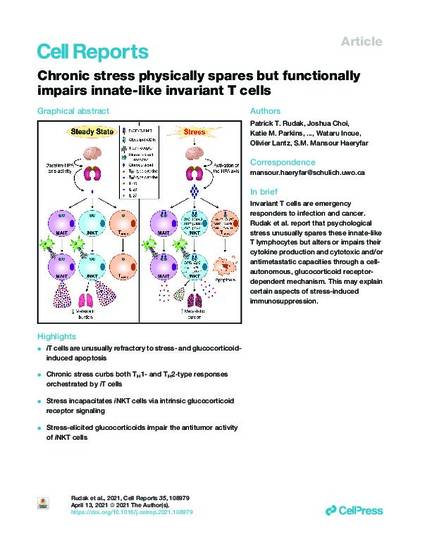
Article
Chronic stress physically spares but functionally impairs innate-like invariant T cells
Cell Reports
(2021)
Abstract
The deleterious effects of psychological stress on mainstream T lymphocytes are well documented. However, how stress impacts innate-like T cells is unclear. We report that long-term stress surprisingly abrogates both T helper 1 (TH1)- and TH2-type responses orchestrated by invariant natural killer T (iNKT) cells. This is not due to iNKT cell death because these cells are unusually refractory to stress-inflicted apoptosis. Activated iNKT cells in stressed mice exhibit a ‘‘split’’ inflammatory signature and trigger sudden serum interleukin10 (IL-10), IL-23, and IL-27 spikes. iNKT cell dysregulation is mediated by cell-autonomous glucocorticoid receptor signaling and corrected upon habituation to predictable stressors. Importantly, under stress, iNKT cells fail to potentiate cytotoxicity against lymphoma or to reduce the burden of metastatic melanoma. Finally, stress physically spares mouse mucosa-associated invariant T (MAIT) cells but hinders their TH1-/TH2-type responses. The above findings are corroborated in human peripheral blood and hepatic iNKT/MAIT cell cultures. Our work uncovers a mechanism of stress-induced immunosuppression.
Keywords
- MAIT cell,
- stress,
- immunity
Disciplines
Publication Date
April, 2021
DOI
https://doi.org/10.1016/j.celrep.2021.108979
Citation Information
Patrick Rudak and colleague s. "Chronic stress physically spares but functionally impairs innate-like invariant T cells" Cell Reports (2021) Available at: http://works.bepress.com/vivianmcalister/299/
Creative Commons license

This work is licensed under a Creative Commons CC_BY-SA International License.
